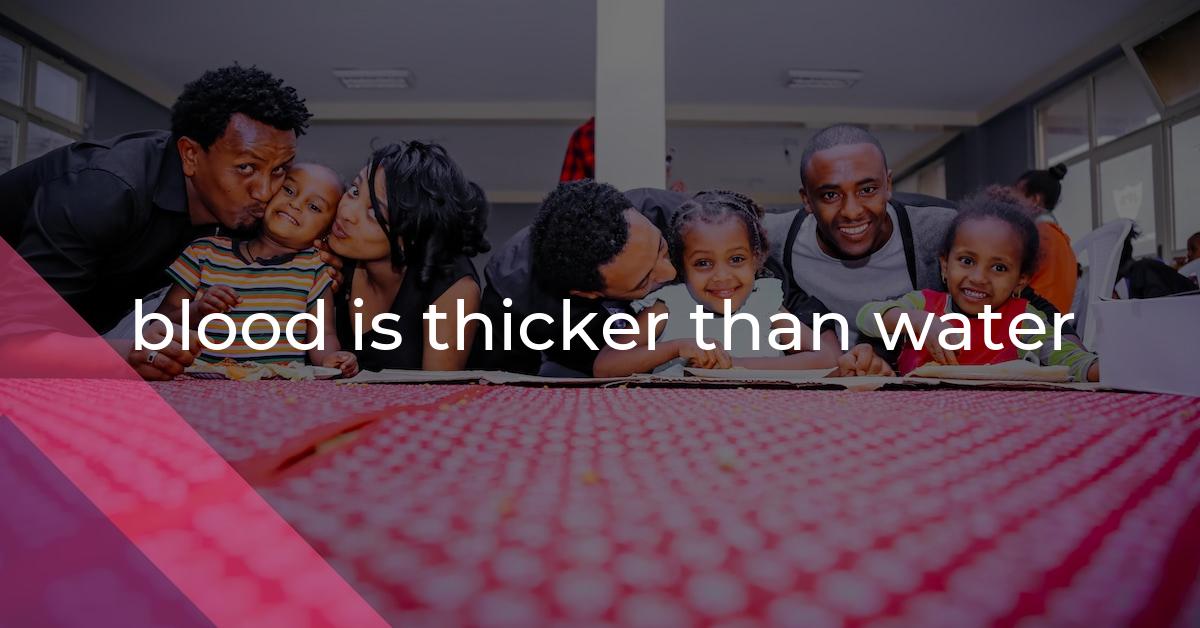blood is thicker than water: Idiom Meaning and Origin
What does ‘blood is thicker than water’ mean?
The idiom "blood is thicker than water" means that family ties and relationships are stronger and more important than any other connections or friendships.

Idiom Explorer
The idiom "kindred soul" refers to a person who shares a strong connection or similarity with another person on a deeper level, particularly in terms of values, beliefs, and interests.
The idiom "hold together" means to stay unified, despite challenges or difficulties, and not fall apart or disintegrate.
The idiom "hold fast" means to firmly grasp or cling to something or someone, both literally and metaphorically, symbolizing determination, strength, and loyalty.
The idiom "have eyes bigger than one's stomach" means to take or desire more than one can actually consume or handle.
The idiom "hang tough" means to persevere or remain determined in difficult or challenging situations. It conveys the idea of not giving up or wavering in the face of adversity.
The idiom "hang together" means to stay united and support each other, especially during challenging or difficult times.
The idiom "friends in high places" means to have influential or powerful connections, typically in positions of authority or privilege. It suggests that having such connections can help one achieve favorable outcomes or access certain advantages.
The idiom "fish in troubled waters" means to take advantage of a difficult or chaotic situation for personal gain or advantage.
Profound Familial Allegiances
The idiom "blood is thicker than water" carries the meaning that familial bonds are stronger and more important than any other relationships.
One prevailing theory suggests that this idiom dates back to the Middle Ages, where blood was believed to be sacred and held a strong religious significance.
Another theory posits that this idiom evolved from an older version that actually conveyed the opposite meaning.
The idiom "blood is thicker than water" has become deeply ingrained in various cultures around the world.
Despite its widespread usage, it is important to note that the idiom "blood is thicker than water" is not always accurate in practice.
Overall, the idiom "blood is thicker than water" has adapted over time to convey the idea that familial connections should be cherished and valued.
However, it is essential to acknowledge and respect diverse experiences and the unique connections individuals may have formed outside of their nuclear family.
As with many idioms, the interpretation and application of this phrase can differ between individuals, offering an endless source of discussion and contemplation.
In addition to the idiom "blood is thicker than water," there are several other related idioms that provide further insight into the complexities of relationships:
The idiom "blood in the water" refers to a situation where someone is vulnerable and in danger, attracting predatory individuals who seek to take advantage.
The idiom "hang together" means to stay united in difficult or challenging circumstances, emphasizing the importance of supporting and relying on one another.
The idiom "get blood out of a stone" is used to describe a difficult or impossible task, highlighting the frustration and futility of attempting to obtain something that is seemingly unattainable.
The idiom "birds of a feather" suggests that people with similar interests, characteristics, or backgrounds tend to associate and bond with one another.
The idiom "bad blood" refers to lingering anger, resentment, or hostility between individuals or groups, often resulting from past conflicts or disagreements.
Example usage
Examples of how the idiom "blood is thicker than water" can be used in a sentence:
- She decided to support her brother in the conflict because, as they say, blood is thicker than water.
- Despite their disagreements, the siblings always stick together because they believe that blood is thicker than water.
- When it comes to family, he believes that blood is thicker than water and that loyalty should always come first.
More "family" idioms



